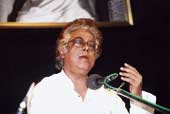 |
| Committed to experimentation: Parapar members on stage (From L to R) Rosalind Acton, Moushumi Bhowmik, Oliver Weeks and Ben Hillyard (Picture by Pabitra Das) |
‘What she sang was uttered word by word,? Wallace Stevens had written in a poem about a woman singing by the sea, ?It was her voice that made/The sky acutest at its vanishing./She measured to the hour its solitude.? For those who are familiar with Moushumi Bhowmik’s songs, her Gyan Manch concert on April 28 would remain an unforgettable event in the evolution of her art towards the kind of lyric utterance that Stevens tries to capture in his poem. The songs she sang that evening are now well known, apart from a few that she has picked up in the course of her song-collecting journeys through rural Bengal. Yet the way she performed them and made them part of a ?dialogue? with other musical traditions (classical and modern, Eastern and Western) made this concert a radical ? and entirely serious ? re-interpretation of her own body of songs.
The other members of her group, Parapar, are accomplished musicians. The guitarist (Oliver Weeks), the cellist (Rosalind Acton) and the double-bass player (Ben Hillyard) are all committed to experimentation, but have also had the best ?classical? training. They brought to the native eclecticism of Moushumi’s sensibility ? mixing kirtan, bhatiyali, Baul, adhunik and Rabindrasangeet ? the rich, gritty sound of wooden string instruments, plucked or bowed, that could modulate effortlessly from a Bach sarabande for unaccompanied cello to the rhythms and harmonies of jazz, funk, Latin and cabaret. Yet the result was not ?fusion? in the popular (and usually banal) sense of the word ? for authentic music is always already ?fused?. When the cello picked up the ?mohonbanshi? of the night’s last train in Shorirtari bhitore, it sounded utterly natural, and one didn’t quite miss the sound of an Indian flute at that point. There is something intense and actual about the human sound of stringed instruments that matches the intellectually complex, often heart-breaking inwardness of Moushumi’s singing.
The feel-good cheap-silk of synthesised music gives way here to a different texture of sound ? stark, harsh, minimal, yet full of a physical energy that, according to her, emanates from the ?youthfulness? of her accompanists, although she distances herself, humourously and with grace, from this youthfulness, as a maturing artiste who is beginning to forget her own lyrics these days. There is, in her stage presence, a naturalness and intensity, an absence of affectation, fakery and clich?, that is totally self-assured, yet genuinely humble.
Most of her songs are about the paradox of being physically, politically and metaphysically unhoused (?Bari kothay??), while living and singing in (and of) the body ? the human body as well as the body of the city (?shohor, shoreer, shomoy?). Sitting bare-foot and blinking awkwardly at the stage-lights, she sang, in Doya karo, of a wish to stand, just once, outside it all ? outside the games of kindness or love, as the Picasso print on the wall gathers mildew, and dryness gives way to rain.
With Juliette Gr?co’s La Chanson des Vieux Amants, Barbara’s Marienbad, Billie Holiday’s Strange Fruit and Joan Baez’s Diamonds and Rust, Doya karo alone could make Moushumi Bhowmik a major contemporary poet and chanteuse.











